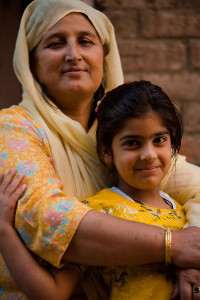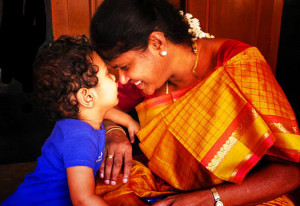The tender touch
By Nandini Sarkar
Her daughter’s sudden complaint made Nandini Sarkar sit up and realise the significance of tenderness in dealing with people.
The Day of Judgment is upon me and it has taken the form of my 18-year-old daughter. Recently, I was feeling particularly pleased that during my mother’s prolonged absence from India, my household and office had both run like clockwork. Completely dependent on her to manage my household and two children for the past several years, I was convinced that my business would come to a screeching halt. But the domestic staff had been more than co-operative; the house was kept sparkling clean, the laundry was done daily; the menus I had planned were extremely well received, and a few innovative home decor ideas also got thrown in, like a bonus. Relatives who had expected the worst, poured in to congratulate me.
Professional, not personal
That’s when the lone voice of dissent piped up and said, “You do get a lot done and I admire you for it. I wonder where you get the energy and the speed from. But you are so professional. Where’s the personal touch?” I looked at my daughter with consternation. She is training to be a lawyer and likes to conclude her cases, so she continued, “You hardly hug us or spend time with us. When we were growing up we always thought Dad was the mother, not you. When I hug you, you give me a distant pat on the back, as though you were encouraging a colleague at work!”
I was immediately defensive and raised my voice slightly, “That’s unfair! I quit work for five years when you were babies; I have always watched over the company you keep and tried to keep you engaged in constructive activities; I have provided all the resources you need to achieve your potential. Remember, in the midst of all this, I had a challenging business to run ”“ what more do you expect from me?”
“Tenderness,” she replied firmly. “We want a mother-figure, not a machine. A crazy mother who fusses over her children, worries when they are ill, listens patiently when they are emotionally disturbed, and gives a daily demonstration of her care. Look at Dad ”“ he would spend hours discussing my tiffs with my best friend and my problems with my school teachers; it was he who skipped work to sit with me at the orthodontist’s for months on end. And it was Dad who waited for me in the car for three hours when I went to the salon to have my hair straightened.”
President Obama with his daughters
I wasn’t convinced. “My parents rarely hugged us but we loved them for their unfailing concern and never thought them cold. Your Dad is a great conversationalist but I am not much of a talker. He volunteered to accompany you to places, so I opted out. With numerous business issues to handle, I was more focussed on providing you the overall framework for your holistic growth rather than fill in on the minor details.”
She threw up her hands, “It’s the minor details that count! Children want this huge motherly aura enveloping them, not a so-called framework! I know for sure that I will handle my children very differently. We will spend loads of time gossiping together and not engage in constructive discussions every time we speak!”
Her brother chipped in with the pacifying comment, “Mum, you’ve changed a lot over the years. We’re sure you can work on this. The thing is, people know they can count on you in difficult situations, but sadly, your presence is missing in everyday, mundane stuff. ”
My husband had his version as well, which he communicated privately. While he commended my efforts at contributing to the family’s affluence, he had many issues with my role as a wife. He felt I behaved more like a friend or buddy than a wife. He missed the wifely touch and yes, the tenderness.
The power of tenderness
Realizing that a resounding judgment had been passed, I backed off. I needed to examine this elusive quality of tenderness. When I thought over the events of my life, I was startled to conclude that I had experienced only tenderness in my vital relationships. I have been a cherished and much loved individual.
As a child of 10, my heart felt wrung like a towel when an epiphany revealed how much God loved me. This tender love, keenly felt, made me a confident and self-assured person. My relationships with my parents, brother, husband, children have also been marked with overwhelming concern from their side. Then why had I failed to pass on the tenderness, or to communicate my love? It could be a pure Gemini trait that Linda Goodman mentions in her much-feted book, Sun Signs. A Gemini woman is described as undemonstrative and unable to show patience in building relationships, block by block. She’s too concerned about getting on with the next mental stimulant, and takes her popularity or partnerships for granted!
In business, we are taught to ask the customer, with a smile: What may I do for you today? Then why hadn’t I cared to ask this question in precious relationships that are the bedrock of my human existence?
From the periphery to the centre
I am beginning to understand, that taking a macro view of relationships makes a person appear distant and unconcerned. I may visualize and plan the best things for my family; I may fill their lives with the best resources, but physically and emotively, if I am on the periphery of their lives, I am creating a void. In the game of life, displaying interest and enthusiasm in the other’s day-to-day affairs, and engaging in a ”˜hands-on’ way, is important. Time management? Trust me, it can be done no matter what mountain of work looms before you. It’s about shrugging off laziness or the unwillingness to go that extra mile because your mind says you are doing too much. It is here that spiritual or holistic training helps. Energizing exercises will keep your adrenaline pumping; pranayama will keep you mentally agile and bring seamless solutions to your work; great human resources will appear out of the blue to help you, and if there are let-downs, you will know how not to take it too seriously.
Renewed commitments
With my own recent turnaround, I have also found that I really don’t need my eight hours sleep every night. The thought of being able to serve both my family and the workplace well, no longer appears impossible. A simple intent ”“ I am going to fill every vital relationship with tenderness ”“ attracts equal tenderness from the Universe. In the midst of my shift, I have keenly felt my Master’s presence. Someone would wake me early each morning without the alarm being set, to practice my daily Kriya Yoga; the cool breeze from the lake enveloping me when I went to gather flowers for worship; the sun, the visible symbol of Om in the sky, would shine down its warm blessings, revitalising me. I developed extra “antenna” to deal with domestic staff; at the workplace, ideas and implementation would flow effortlessly, surprising me. Through all of this I felt my Master whispering from eternity and guiding my unsure steps. I wept unashamedly to think that a great Master would have so much connect with his disciples that he would participate even in their mundane transitions.
With my commitment to do better, I felt a great cleansing of the heart. As I strive to give my family the human touch rather than the efficient planner’s touch, I also notice, that with their reciprocal good wishes, my business relationships have vastly improved this year. The elusive “luck” factor, that businessmen crave to attract, seems to be more visible!
God couldn’t be every where so he created mothers – A Jewish proverb
The God who comes
When psychotherapist Carl Rogers introduced the revolutionary concept of People Centred Counselling, with empathy at its core, it was treated with suspicion. Today, it is all the rage. His ardent follower, therapist Brian Thorne recounts a spiritual event, at age of nine, which transformed his life and calls it, “The God Who Comes”. He describes it as “the almost unbearable experience of glimpsing the nature of the passion and crucifixion of Christ”. The outcome was an enduring sense of being loved “beyond all the possible limits of my imagining” which became the basis of his deep acceptance of both himself and others. This experience revealed to him an essential truth. He, together with all humanity, is infinitely desirable to God. He received an intuitive understanding that negative self-judgments and lack of self-worth conceal us from the truth that God is an enduring and tender presence in our lives.
Unconditional acceptance
People-centred counselling is based on the premise that people are inherently trustworthy and, given favourable stimuli, such as tenderness, will accomplish their full potential. Setting, ”˜conditions of worth’ ”“ such as a mother telling her child that she will only love him if he tops the math exam ”“ is debilitating. It requires a commitment to develop yourself to achieve a deep level of acceptance of others. Cultivating tenderness is perceived as evolutionary in the following directions:
Ӣ Away from false facades and the constant preoccupation with keeping up appearances
”¢ Towards valuing honesty and ”˜realness’ in one’s self and others
Ӣ Accepting and valuing feelings, whether they are positive or negative
Ӣ Valuing the experience of the momenteven if it is negative or undesirable
Ӣ Understanding the steady process of growth rather than striving to meet objectives quickly
The presence of ”˜presence’
Carl Rogers stumbled upon another path-breaking discovery. He found, that in practising tenderness, a similar transcendental quality, which he called “presence”, surfaced in the self. His experience was that tenderness emerges when a relationship is characterised by acceptance, empathy and congruence. This not only leads the therapist in touch with his inner intuitive self, but he is also able to reach out and touch the inner spirit of the client. The relationship then touches an altered state of consciousness and an awareness of being caught up in something larger. He describes this as being caught up in a stream of love. This is accompanied by effortless understanding, profound growth, energy and healing.
Liberating paradox
According to Thorne, we are trapped by paradoxical aspects of ourselves, because we experience them as contradictions, such as love/hate, strength/weakness, either/or. This results in paralysis and our evolution stagnates. For example, one can love one’s mother but hate her also, so one can neither rebel nor conform. To experience both poles and own them as complementary is liberating and releasing, freeing us from emotional prison. In a remarkable case study of a student, Colin, therapist Thorne was struck by the fact that in many ways Colin and he were unlikely companions. Thorne was a married, middle-class, middle-aged, heterosexual, liberal Christian, whereas Colin was a young, homosexual, working-class Marxist, agnostic, history student. He sensed that because he was so different, Colin’s experience of his acceptance and empathy was more powerful. During two sessions Colin wept, and said: “It is nice to be able to say what I want here, I always feel safe.” During six weeks of therapy, Thorne saw Colin move from feeling paralysed, hopelessly immature, weighed down with sexual conflicts, terrified of the judgements of his working class parents, to discovering that he need not be trapped by the judgements of others, and that he could actually take over the direction of his own life. Thorne remained his supportive companion in the enterprise. By then, Colin had a first class degree, a home of his own, and a sexual partner.
The lowdowns
So what does it mean for a person to possess the quality of tenderness in all its fullness? People-centred therapists have this checklist:
”¢ It is a quality which radiates from the total person ”“ it is evident in the voice, the eyes, the hands, the thoughts, the feeling to things animate and inanimate, seen and unseen.
Ӣ It responds with openness to vulnerability and communicates to the sufferer that suffering and healing are interwoven.
Ӣ It demonstrates an ability to move between the worlds of the physical, the emotional, the cognitive and the mystical without
strain.
Ӣ It is without shame because it is experienced as the joyful embracing of the desire to love.
Ӣ It will be evident that so breathtaking a quality is rare.
I may visualize and plan the best things for my family; but physically and emotively, if I am on the periphery of their lives, I am creating a void
Tenderly yours
Just before writing this, I was on a flight back home. The young girl next to me seemed loud and obnoxious, and I ignored her. Suddenly, she clutched me and said, “When the plane takes off my neck spins and I feel I’m going to die. Please talk to me to distract my mind! Please talk to me!” I thought she was mad, and was about to buzz the steward, when I turned and saw her face. She was sweating profusely, her swagger was gone and there was torment on her face. I started chatting with her. We ended up talking for the next two hours. I discovered she had recently lost her father and was traumatised because of her deep attachment to him. Also that she had a handicapped elder sister, a difficult mother, a string of disappointing friendships and business relationships, and an absentee elder brother. Her torment then became clear to me. I was touched when she said to me at the end of the flight that she had been praying to God for the past three days to send someone to relieve her torment and it had happened.
(This article is courtesy Life Postive Magazine, India)
About the author
Nandini Sarkar is Co-founder, C-Quel, a management services company. A lover of the spiritual Masters she is a follower in the Kriya Yoga tradition. nandini@cquel.com
Short URL: https://indiandownunder.com.au/?p=4693




